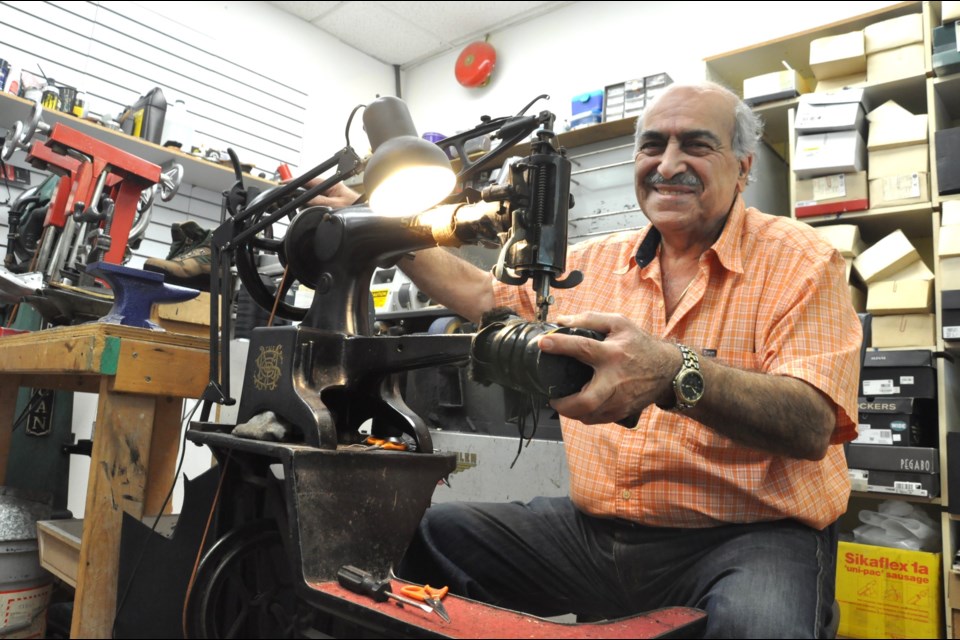Every morning, Ali Akhlaghi drives from his Coquitlam home to open his little storefront, Ali’s Shoe Repair at Garden City Shopping Centre.
This has been his routine for the past 33 years.
Despite speaking little English, Akhlaghi has raised his two children and served tens of thousands of Richmondites in this store.
And the 77-year-old man has no plans to retire and recently renewed his lease, again, and still opens the shop six days a week.
“I love the nature of my work…I enjoy the interaction with my customer base and I like the art because I’m creating something that’s broken,” said Akhlaghi through the translation of his son Arash.
For Akhlaghi, shoe repair is not just work, but a fun thing to do and his "calling” – he enjoys finding solutions where people may not necessarily see them and the gratification when people come in with shoes in rough shape and walk out with brand-new looking ones.
“What am I going to do sitting at home with my wife all day, every day [after retirement]? I'm not gardening, I'm not doing anything else,” said Akhlaghi with a laugh.
“This keeps my mind fresh and busy and allows me to continue keeping in touch with my neighbours that I’ve known for more than 30 years.”
From Iranian factory owner to Richmond cobbler
Akhlaghi’s “career” in shoes started more than 70 years ago. To support a large family of six sisters and three brothers in Iran, he became a breadwinner at age of six, working at a small shoe shop.
As an adult, he opened a holiday resort, a shoe store and a shoe manufacturing plant – he even had a side gig as an actor for a few years, until the Iranian Revolution broke out in 1979, followed by nine years of the Iran-Iraq War.
Akhlaghi sold everything to pay for smugglers to help him and his family travel to Canada, and they finally landed in Canada as refugees in 1988, with $500 to start a new life.
Knowing little English, Akhlaghi returned to what he knew best – shoes. After working for other repair shops for a few years, he became one of the first tenants at Garden City Shopping Mall when it opened in 1991.
“I am amazed by immigrants [like Akhlaghi] that come to this country barely speaking English and are so brave to open their own business,” said Jackie Vargas, senior property manager of the mall.
Arash said he doesn’t remember his father taking any day off except Sundays, and he only had two vacations, which his family forced him to take, over the past three decades.
“We work hard for everything. Nothing was handed to us with him having to start working at such a young age... So when you are looking at the type of people like my father who worked for 71 years of their life, they don’t know anything more,” said Arash.
“Today's society people may jump from one branch to another, but people like my father and the generation before us have a different way of living their lives – they do the same thing every day for 20, 30, 40 years without ever complaining.”
Akhlaghi said one of the highlights of his time at Garden City Shopping Centre is that there were five years when his wife opened a Greek restaurant next to his shoe repair shop – they would go to work and have lunch together every day until she decided to retire.
A declining industry
The shoe repair business has changed dramatically over the past 15 to 20 years ago, as the lower cost of shoes means people choose to replace them rather than have them fixed.
“I’ve come to grips with it,” said Akhlaghi.
He said about 95 per cent of people prefer to replace their shoes instead of repairing them.
But five per cent, some of whom may have spent thousands of dollars on a pair of shoes, or have shoes they cherish and want to maintain, still need his services and skills.
“I’ve got several customers that come all the way from Vancouver for the last 33 years. They bring bags and bags of shoes to get repaired, they bring gifts and Christmas gifts and stuff,” said Akhlaghi.
As more cobblers retire and leave the industry with no one taking over their businesses, Akhlaghi said he wants to make sure those customers have the support system here when they need it.
“His biggest downfall has always been as he's getting older,” said Arash.
"It's a very heavy labour type of business and is very difficult on his body as the majority of his time is standing up for working... So the timeline on his retirement is [ahead]."
But for now, Akhlaghi will continue to open his shop every day and find solutions for each pair of shoes brought to him.
Akhlaghi said he is very proud of his two sons, one of whom now works in Richmond. When asked if he is proud of what he has achieved, he didn’t answer.
“He will never admit that,” said Arash with a smile.
Got an opinion on this story or any others in Richmond? Send us a letter or email your thoughts or story tips to [email protected].



